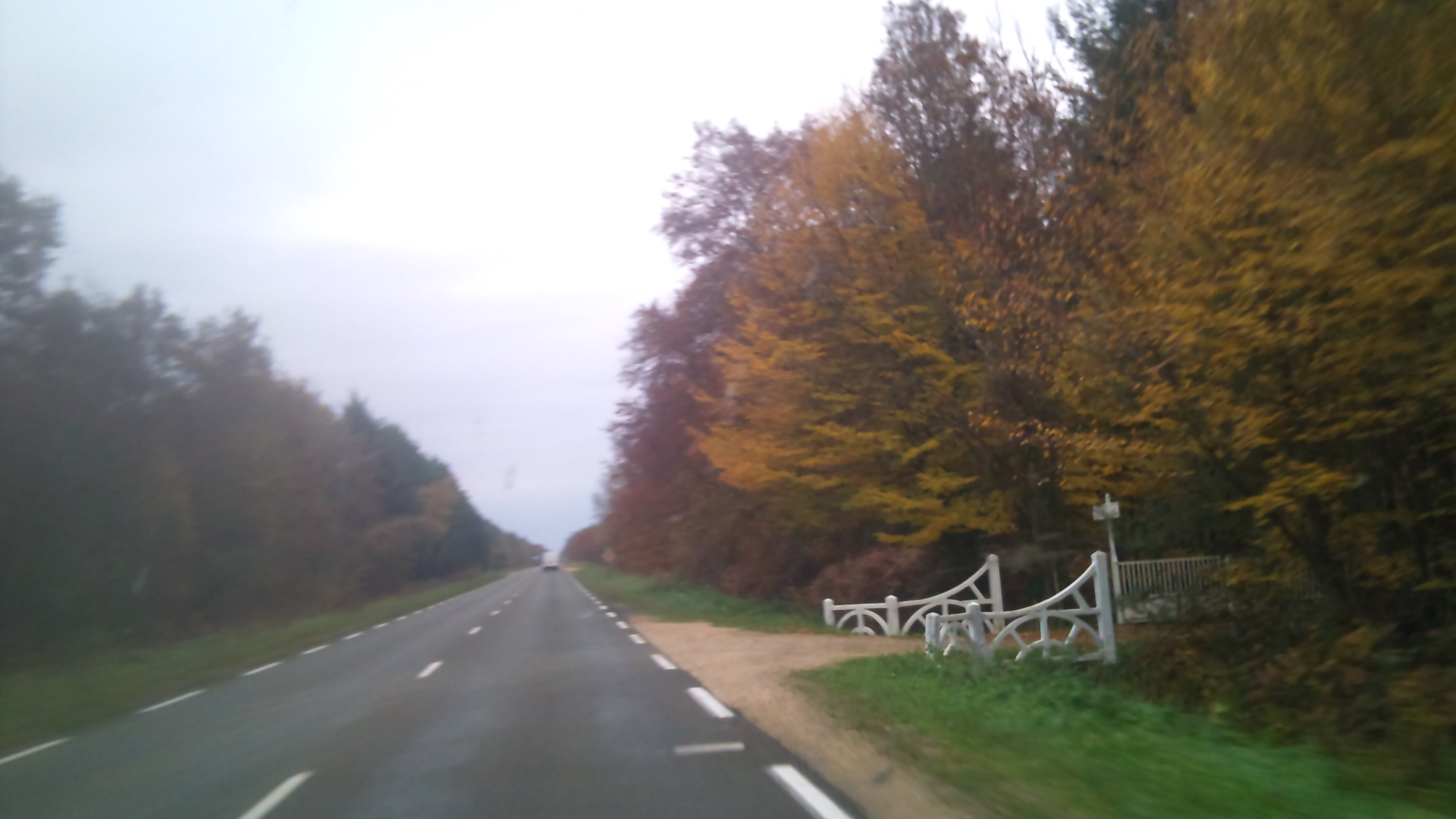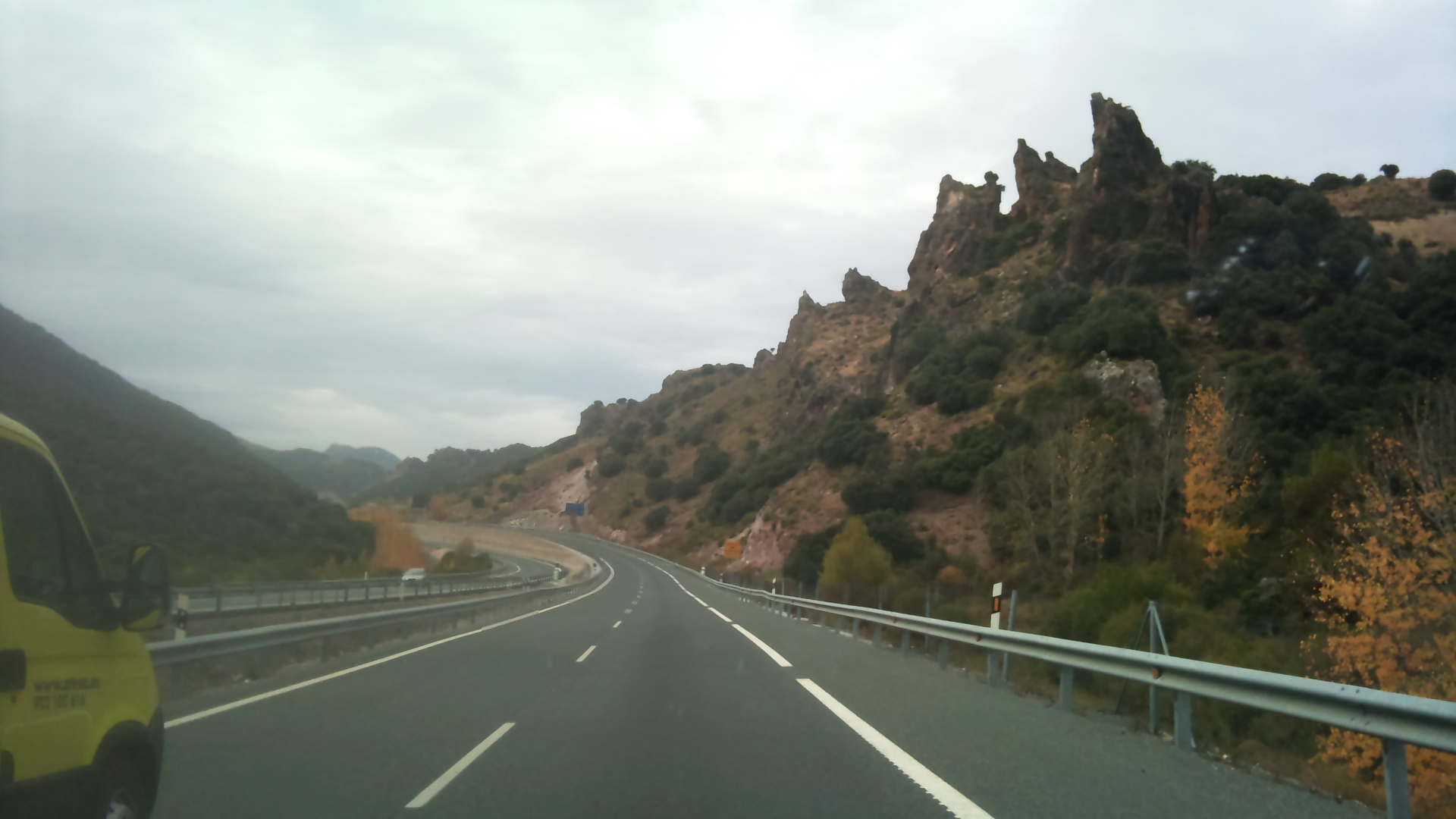 Reanna read it
Reanna read itSince driving in the UK also drives me nuts, I guess you'll be able to read about that too sooner or later.


How to annoy foreign drivers : drive in their country.
If you set out to drive for
3 days across France and Spain, headed for as far south as you can get unless you want to swim to Morocco, you go prepared as best you can.
A familiar vehicle
is a big help even when you are driving it on the “wrong” side of the road. The
WRONG side is where you are when you forget where you are.
If you drive a “foreign” vehicle, in other words left hand drive, be prepared to open the window when you want to change gear and to indicate by switching on your lights, that kind of thing. It’s best not to think too far in advance or try to convert everything in your mind, right and left get muddled up in the panic of anticipating which way to go round a roundabout. Tip – the same direction as everyone else.
When my friend Jane first drove in Spain, she asked me which lane she should take on the roundabouts. My advice was suitably vague, whichever one you feel safest in, because either way someone will think they should be where you are. Don’t ever assume that even if you are in the right lane you won’t get cut across.
Don’t bother flashing your lights as a courtesy signal, it will be either ignored or interpreted as aggression. Don’t try to give way when it isn’t required, politeness will be construed as dithering. And don’t please don’t ever expect anyone to give way to you if you are in the wrong lane, that is entirely your fault and if you end up going 200 miles the wrong way, tough, not to mention they would pefer to see you crash and die that let you pull out. You should expect to slow and even to stop waiting to pull out from a slip road no matter whether the outside lane is clear and you might think a driver in the inside would move over.
This incomprehensible change comes over the normally affable Spanish who queue impossibly in the banks and Post Office whereby you may keep your place AND sit down to wait your turn, and upon joining the queue one must always enquire as to who is last ahead of you. Politeness itself. But take to the roads, well. Even the pavements. DO NOT GIVE WAY, or thank those who do, is the norm. How strange.
The French drive at speed. Do not get in their way. That speck in the distance in your rear view mirror will be attached to your bumper, flashing his lights and hooting furiously by the time you are level with whatever you are overtaking at a modest 70mph. The French get into a car, look at the top end of the speedometer and aim for it. It is capable of doing 120mph? Then that is what they will aim to do. Speed is top priority and they disappear into distance while you are still registering the fact that you’ve been overtaken while you are doing 70mph.
The Spanish have a different approach. They need to be in front of you. Do not get in their way. They are mostly good catholics and many have a rosary in the car. Therefore the Virgin Mary is protecting them and they can drive how they like. Overtaking is compulsory, speed is reckless and skill optional compared to the French. You can see this on any road entirely unsuitable for fast driving or overtaking, normally by the presence of a gesticulating Spaniard in your rear view mirror and almost in your boot, and the number of floral tributes along the roadside.
You soon develop a thick skin. Overtake if you want but I will not be bullied into doing speeds I don’t feel comfortable with. Hoot all you want.
They have a similarly blasé approach to parking. They all have parking sensors – they are called bumpers. You stop when you reverse into something. Do not have a nice new shiny car in Spain unless you never ever ever park anywhere public. Scratches and dents appear miraculously every time you inspect your vehicle. Which will also be covered liberally in dust to the point of obscuring the windows completely. It is for this reason that car washes are so popular and prevalent here, not to keep the car shiny but to hose off the dust. The risk of crime and vandalism is present; I wasn’t impressed when someone removed my security key locked fuel cap one night but on the other hand the effort repaid them badly as the tank was all but empty in the first place. Even less impressed was I when the plastic trim down the side of the windscreen disappeared. If it was that easy, I mused, could I bring myself to snaffle one from another fairly rare transit van on the basis of the odds that the owner was the thief and I was simply reclaiming own lost vehicle part?
As for parking, there are rules and restrictions. If you park in a one way street on the last day of the month overnight, do not be surprised if your cark is towed away the following morning when the side of the street where you have parked changes to the other side. You should also expect cars parked anywhere a car will fit whether it looks like a space or not, including the hatched areas akin to an island in the road, on pavement corners, in impossibly small spaces and most particularly as near as possible to the destination. Whilst the Spanish conscientiously go for healthy walks morning and night, they have no intention of parking any further than necessary from wherever they are going.
Zebra crossings may have traffic lights or they may not. Pedestrians have right of way (yes, what a novel idea) and as a motorist you learn to scan ahead for people on pavements likely to leap into the road as you approach a crossing. As a pedestrian you do well to anticipate the ex pat drivers who think this is an outrageous liberty and are likely to run you over. Traffic lights miss out the amber stage. Red to green. Flashing orange means go if it is safe to do so. You need rapid vision and reflexes. The way out of the supermarket car park barrier is via the bar code printed on the bottom of your till receipt you either allowed to blow away in the car park or stuffed in the bottom of your huge shopping bag. This you quickly remember for the second visit. Parking meters are not always visible and the instructions vague or contradictory at pay machines. Best to ask a local. Well, a non vindictive nice one likely to a) know, and b) tell the truth. BUT should you get a parking ticket you can, in Almunecar certainly, pay the machine within a short time after and get away with it.
Mopeds are apparently always in the right so however unavoidable or tempting DON’T hit one, even though they overtake both sides and swerve and cut in as part of their death-defying antics.
Insurance routinely allows other drivers over 25 to use your car without being named. Road tax is paid at the town hall offices but on the other hand you don’t have to pay – until you want to sell it or scrap it and then the total must be paid, same applies to speeding fines. Abandoned cars are sometimes there for that very reason, and if can actually be several weeks before a wheel goes missing and then the whole process of dismantling it kicks in, leaving presumably just the chassis number to identify the non-paying former owner.
Following directions is a hazard. IN the UK you get a sign pointing somewhere and unless there is genuinely another road going to the same place, that’s it. Miss your exit on the motorway and that’s tough luck. Come off, turn round, go back, try again. In Spain they have the endearing habit of signposting places you can get to by literally doing that. Go 50 miles or even more past the proper exit to Granada, say, and you will find signs pointing off to Granada. Confused? You will be. It is not the road there at all, but your 2nd, 3rd or even 4th chance to correct your over-shoot. Aw, bless, but if you misunderstand you might curse instead.
Got your two warning
triangles, enough safety vests for the number of seats, a full set of spare
light bulbs, and spare spectacles, and all your documents where they can be
reached? Good. Off you go. And don’t upset the locals.
Wear that GB plate with pride and drive like a Brit. They will expect nothing less. Or nothing they can understand anyway.